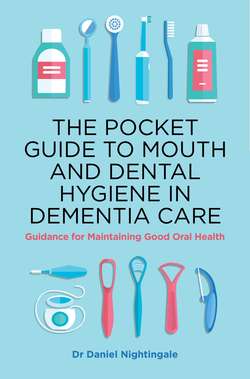Читать книгу The Pocket Guide to Mouth and Dental Hygiene in Dementia Care - Dr Daniel Nightingale - Страница 4
Introduction
ОглавлениеOral care in the senior population is no less important than in other age groups. For example, current statistics show that one in ten older adults die from aspiration pneumonia. This makes it the leading cause of death among this population. A contributing factor to aspiration pneumonia is poor oral hygiene and dental neglect (Manabe et al. 2015).
Many older people, those living with dementia and those experiencing mental health challenges face major issues with this area of self-care. There are many reasons for this, and they are addressed in the chapters that follow.
I have been a clinical dementia specialist since 2002 and a clinical hypno-psychotherapist working in the field of mental health since 2007. Working across both the UK and US, I am greatly concerned about the malignant impact that dental neglect has on both psychological and physical health. Unfortunately, in the UK, it isn’t always easy finding and registering with an NHS dentist, and paying privately can be expensive. For example, a private dental exam costs £42, a full set of dentures around £554, a first initial consultation £53 and £60 for a cleaning. In the US, if you don’t have dental insurance, treatment costs can be extensive, therefore many people may make dental care the least of their priorities. For example, a basic cleaning in Arizona, which should be done every six months (this may be every three if one experiences tooth or gum disease), costs approximately $100. In a state where benefits are not overly common or easily accessible, the reader can see how this would be a financial burden on someone living with dementia or mental illness.
Vulnerable people, whether children or adults, require as much support as possible with this area of self-care; this guide will assist in achieving that goal. It can be very challenging brushing an individual’s teeth, especially if that person does not comprehend what is being done to them (a poignant reminder here that we should be supporting and doing with people and not to them). Visiting a dentist’s office can increase the fear and anxiety levels of those living with dementia, severe clinical depression, schizoaffective disorder or other mental illness, and those with Down’s syndrome and Alzheimer’s disease. There are many other developmental disorders such as autism, and mental illnesses such as schizophrenia where meeting oral hygiene and dental care needs may require innovative approaches and interventions. The key to a successful outcome is to step outside our reality and into that of the person we are supporting.
In this guide, I will cover how poor dental and oral care impacts negatively on the individual; tips and tricks for optimal oral care; proactive oral and dental care; prioritizing oral care needs; how to spot oral disease; oral care and mental illness, and the positive dental experience. At the end of the book there are interactive case studies that involve the reader, and five common questions that are asked by those supporting the person through their particular journey.
The overall aim is to ensure that the reader is equipped with additional knowledge and skills to improve oral care and hygiene as well as dental treatment. Ultimately this will lead to enhanced quality of life through good physical and psychological health.
Dr Daniel J. Nightingale, PhD; RN;
ADHP (NC); ECCH; CHt, clinical dementia specialist
and clinical hypnopsychotherapist
